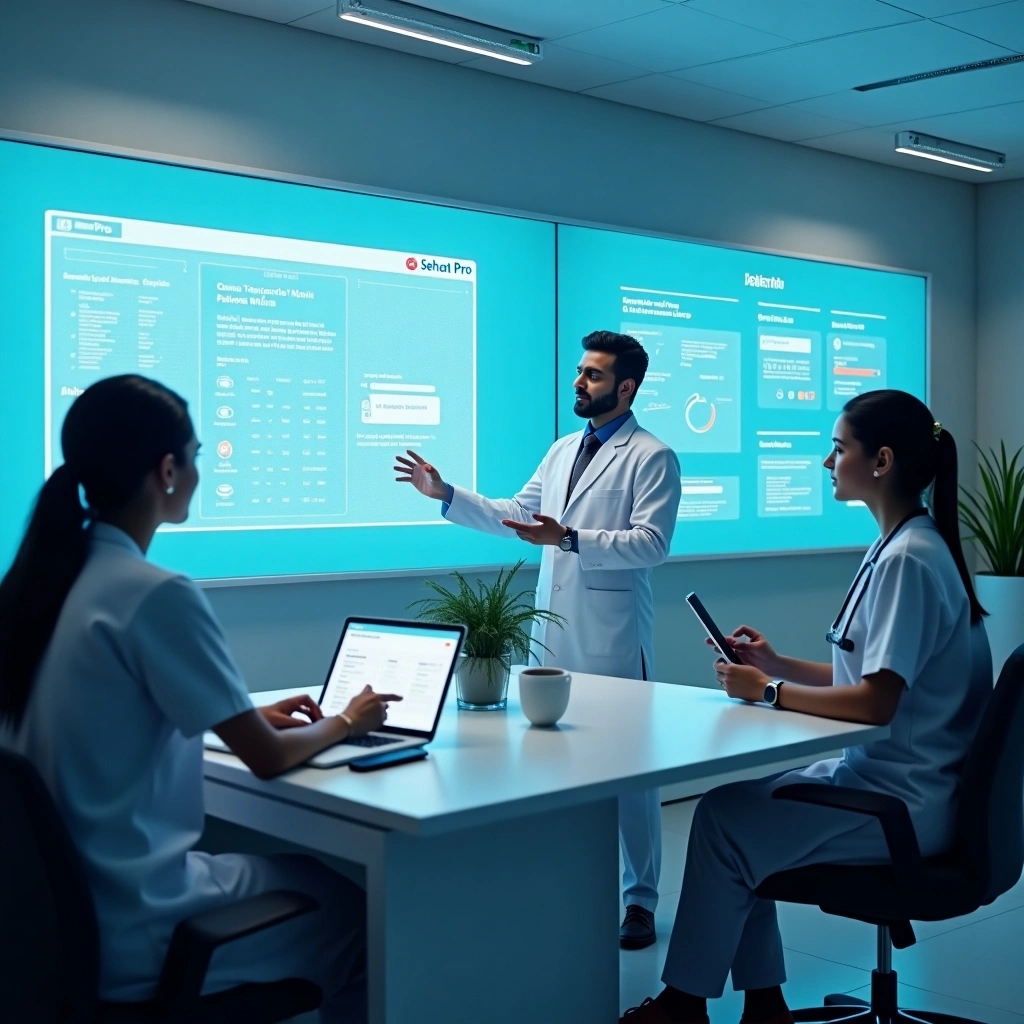How is Electronic Medical Records (EMR) Changing Healthcare in Pakistan?
Electronic Medical Records (EMR) have become one of the key drivers of digital transformation in healthcare across the world, and Pakistan is no exception. The healthcare system in Pakistan has faced challenges such as inefficiency, lack of proper patient data management, and a shortage of skilled personnel. EMR systems are making a notable difference by modernizing how patient information is stored, accessed, and used. But how exactly is this technology changing the healthcare landscape in Pakistan, and what role does it play in improving medical practices?
What is the Role of EMR in Streamlining Patient Care?
In traditional healthcare systems, patient information is often scattered across different locations—hospitals, clinics, and private practices. This fragmentation leads to delays, errors, and complications when seeking treatment. However, with EMRs, healthcare providers can access patient information quickly and easily. This integration ensures that medical staff have a comprehensive view of a patient’s history, diagnoses, prescriptions, lab results, and treatment plans, all in one place.
In Pakistan, where the healthcare system has been notorious for administrative inefficiencies, EMRs have become a game-changer. By digitizing patient data, doctors can make informed decisions more rapidly, reducing the chances of misdiagnosis and unnecessary tests. Furthermore, patients benefit from faster and more coordinated care, especially when they visit multiple healthcare providers or need to transfer between hospitals.

How Are EMRs Improving Efficiency in Pakistani Hospitals?
Hospitals and healthcare facilities in Pakistan have long struggled with managing high volumes of patient data. Manual systems of record-keeping are not only prone to errors but also time-consuming. Doctors and staff often have to spend significant amounts of time searching for physical files, which diverts their attention from actual patient care.
With the adoption of EMR systems, healthcare providers can significantly improve operational efficiency. Patient records can be updated in real time, allowing different departments to collaborate more seamlessly. For instance, when a patient visits a hospital for a consultation, their records can be instantly accessed by the lab technician for testing or by the pharmacist for prescription management.
Additionally, the ability to monitor patient data remotely has enabled better follow-ups and continuity of care. Doctors can access patient history and ongoing treatment details from the comfort of their offices or even from home. This not only saves time but also reduces the chances of medical errors and helps allocate resources more effectively.
How Do EMRs Enhance the Accuracy and Quality of Healthcare Services in Pakistan?
One of the biggest concerns in the Pakistani healthcare system is the quality of care provided to patients, which can often be compromised by poor record-keeping and communication gaps between healthcare providers. EMR systems address these concerns by providing a more reliable and accurate method for storing and retrieving patient data.
EMRs can help prevent medication errors, one of the most common issues in healthcare. For instance, when a doctor prescribes medication, the EMR system cross-references the patient’s history to identify any potential allergic reactions or drug interactions. This level of detail helps reduce the risks associated with medication administration, ultimately leading to better health outcomes.
Moreover, with the integration of decision support tools in EMRs, doctors can rely on evidence-based guidelines and suggestions to make better clinical decisions. These tools also help in identifying patterns or trends in patient data, allowing healthcare providers to diagnose conditions earlier and with more accuracy.
What Are the Benefits of EMR in Enhancing Patient Privacy and Data Security?
With an increasing focus on data privacy and security in healthcare, EMRs offer a distinct advantage over paper-based systems. In Pakistan, where there have been growing concerns about the confidentiality of patient information, EMRs provide a secure platform for storing sensitive health data.
EMRs employ encryption and other security protocols to ensure that patient records are protected from unauthorized access. Additionally, these systems allow for better tracking of who accessed a patient’s records and when, providing an audit trail that is essential for regulatory compliance and maintaining trust between patients and healthcare providers.
Furthermore, by reducing the reliance on physical records, EMRs mitigate the risks associated with natural disasters, theft, and document misplacement. In a country like Pakistan, where natural calamities such as floods can destroy medical records, the digitalization of health data is a critical safeguard
What Role Does EMR Play in Facilitating Telemedicine and Remote Consultations?
Telemedicine has seen exponential growth globally, especially in regions where access to healthcare professionals is limited. In Pakistan, rural areas often struggle with a shortage of doctors, and patients must travel long distances to seek treatment. EMRs can play a vital role in bridging this gap by facilitating telemedicine and remote consultations.
With EMR systems, healthcare professionals can access patient records remotely and offer virtual consultations. This means that even patients in far-flung areas can receive medical advice, prescriptions, and referrals without the need to leave their homes. In Pakistan, where healthcare infrastructure is more developed in urban centers, EMRs enable doctors in cities to extend their services to rural populations, making healthcare more accessible and equitable.
How Do EMRs Contribute to Health Data Analytics and Public Health Improvement?
One of the most significant advantages of EMRs is their ability to collect vast amounts of health data, which can be analyzed to improve public health outcomes. For instance, by aggregating and analyzing data from multiple healthcare providers, policymakers can identify trends in disease outbreaks, vaccination rates, and the prevalence of chronic conditions.
In Pakistan, where public health challenges such as tuberculosis, malaria, and non-communicable diseases remain prevalent, EMRs can be used to track the effectiveness of treatment programs and identify areas that need improvement. Data-driven insights can help allocate resources more efficiently and improve the overall quality of healthcare services.
What Are the Challenges and Limitations of Implementing EMR in Pakistan?
Despite the many benefits of EMR, there are still several challenges to widespread implementation in Pakistan. One of the main obstacles is the lack of infrastructure, particularly in rural areas where internet connectivity may be unstable or unavailable. Additionally, there is a shortage of skilled personnel trained in using EMR systems, which can hinder their adoption.
Moreover, the cost of implementing EMR systems can be prohibitive for many healthcare providers, especially smaller clinics and hospitals. Although the long-term benefits of EMR outweigh the initial investment, the upfront cost remains a barrier for many.
Finally, there is a need for clear policies and regulations surrounding data privacy and security to ensure that patient information is protected from misuse. Pakistan’s healthcare sector still needs to catch up in terms of enforcing strong cybersecurity measures and establishing a legal framework to govern electronic health records.
How Will the Future of EMR Transform Healthcare in Pakistan?
The future of healthcare in Pakistan looks promising with the continued growth of EMR systems. As more healthcare providers adopt these technologies, patient care will continue to improve, and healthcare services will become more efficient. In the coming years, we can expect to see greater integration between EMR systems and other health technologies, such as artificial intelligence (AI) and machine learning, which will further enhance the ability to diagnose and treat patients.
With continued investment in digital health infrastructure and the training of healthcare professionals, Pakistan has the potential to transform its healthcare system into one that is more modern, efficient, and accessible to all.
Ready to Upgrade Your Clinic?
Make your clinic smart, fast, and paperless with SehatPro Clinic Management Software.
Call or WhatsApp for Free Demo & ConsultationFAQs on the Role of EMR in Revolutionizing Pakistani Healthcare Practices
1. What is EMR, and why is it important in healthcare?
Electronic Medical Records (EMR) are digital versions of patients’ paper charts. They provide a real-time, patient-centered record that can be accessed by healthcare providers to manage and streamline patient care. EMRs are crucial because they improve the accuracy, efficiency, and accessibility of patient data, leading to better medical outcomes.
2. How do EMRs improve patient care in Pakistan?
EMRs help healthcare providers access a patient’s complete medical history quickly, reducing delays and errors in treatment. They also enable doctors to make more informed decisions, enhance collaboration among healthcare teams, and improve the quality of care.
3. Are EMRs secure?
Yes, EMRs use encryption and other security measures to protect patient data from unauthorized access. The use of audit trails ensures that all interactions with patient data are tracked, enhancing transparency and accountability.
4. What challenges does Pakistan face in adopting EMRs?
Challenges include the high cost of implementation, lack of infrastructure in rural areas, and the need for trained personnel to manage and operate EMR systems. Additionally, there is a lack of comprehensive regulations governing the use of EMRs in Pakistan.
5. How can EMRs support telemedicine in Pakistan?
EMRs facilitate telemedicine by allowing healthcare providers to access patient records remotely. This enables virtual consultations, making healthcare more accessible, especially in rural or underserved areas of Pakistan.
6. What impact can EMRs have on public health in Pakistan?
EMRs can collect large amounts of health data that can be analyzed to identify trends in disease patterns, helping policymakers improve healthcare delivery and allocate resources more effectively. They can also enhance the monitoring of public health initiatives and improve overall health outcomes.




